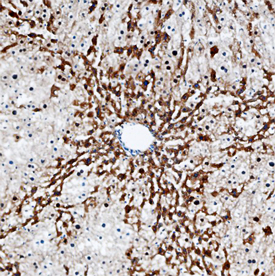Mouse Kynureninase Antibody Summary
Met1-Ser464
Accession # Q9CXF0
Applications
Please Note: Optimal dilutions should be determined by each laboratory for each application. General Protocols are available in the Technical Information section on our website.
Scientific Data
 View Larger
View Larger
Detection of Mouse Kynureninase by Western Blot. Western blot shows lysates of mouse liver tissue. PVDF membrane was probed with 0.5 µg/mL of Rat Anti-Mouse Kynureninase Monoclonal Antibody (Catalog # MAB7389) followed by HRP-conjugated Anti-Rat IgG Secondary Antibody (Catalog # HAF005). A specific band was detected for Kynureninase at approximately 50 kDa (as indicated). This experiment was conducted under reducing conditions and using Immunoblot Buffer Group 1.
 View Larger
View Larger
Kynureninase in Mouse Liver. Kynureninase was detected in perfusion fixed frozen sections of mouse liver using Rat Anti-Mouse Kynureninase Monoclonal Antibody (Catalog # MAB7389) at 25 µg/mL overnight at 4 °C. Tissue was stained using the Anti-Rat HRP-DAB Cell & Tissue Staining Kit (brown; Catalog # CTS017) and counter-stained with hematoxylin (blue). Specific staining was localized to cytoplasm of hepatocytes. View our protocol for Chromogenic IHC Staining of Frozen Tissue Sections.
Reconstitution Calculator
Preparation and Storage
- 12 months from date of receipt, -20 to -70 °C as supplied.
- 1 month, 2 to 8 °C under sterile conditions after reconstitution.
- 6 months, -20 to -70 °C under sterile conditions after reconstitution.
Background: Kynureninase
Kyureninase (KYNU, a hydrolase that acts on dog [Greek: kyon] urine [Greek: ouron]) is a 50-55 kDa member of the kyureninase family of enzymes. It is a pyridoxal phosphate-dependent cytosolic hydrolase that occurs in a variety of cell types, including hepatocytes and macrophages. Kyureninase participates in the metabolism of tryptophan. Dietary Trp is either incorporated into protein, or metabolized into niacin, serotonin or NAD. Kyureninase catalyzes one of two steps that lead to the formation of a key downstream intermediate called 3-hydroxyanthranilic acid. Mouse Kyureninase is 464 amino acids (aa) in length. It contains one large catalytic site (aa 24-462), and typically functions as a noncovalent homodimer. There are at least two potential isoform variants. One contains a three aa substitution for aa 425-464, while another possesses a 22 aa substitution for aa 302-464. Full-length mouse Kyureninase shares 92% and 83% aa sequence identity with rat and human Kyureninase, respectively.
Product Datasheets
Citation for Mouse Kynureninase Antibody
R&D Systems personnel manually curate a database that contains references using R&D Systems products. The data collected includes not only links to publications in PubMed, but also provides information about sample types, species, and experimental conditions.
1 Citation: Showing 1 - 1
-
The tryptophan-metabolizing enzyme indoleamine 2,3-dioxygenase 1 regulates polycystic kidney disease progression
Authors: Nguyen DT, Kleczko EK, Dwivedi N et al.
JCI Insight
FAQs
No product specific FAQs exist for this product, however you may
View all Antibody FAQsReviews for Mouse Kynureninase Antibody
There are currently no reviews for this product. Be the first to review Mouse Kynureninase Antibody and earn rewards!
Have you used Mouse Kynureninase Antibody?
Submit a review and receive an Amazon gift card.
$25/€18/£15/$25CAN/¥75 Yuan/¥2500 Yen for a review with an image
$10/€7/£6/$10 CAD/¥70 Yuan/¥1110 Yen for a review without an image

